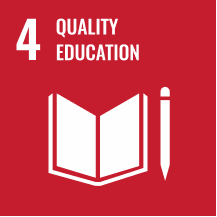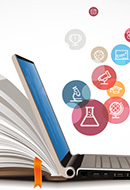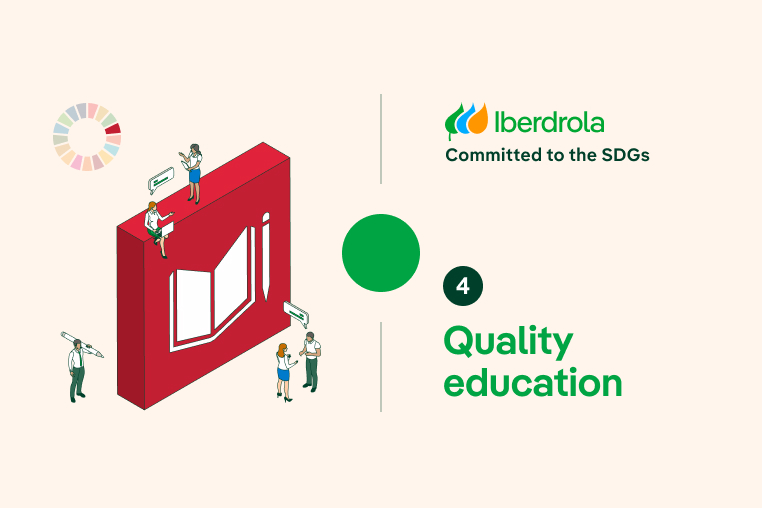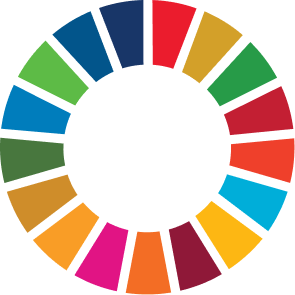SDG 4: Quality education
Iberdrola is committed to education as a means of transforming society
As part of its commitment to the United Nations' Sustainable Development Goals, Iberdrola Group is committed to quality, inclusive and equitable education. Achieving this goal requires encouraging lifelong learning opportunities for everyone.
Our contribution to SDG 4: Quality education
 Iberdrola Group has contributed €6.96 million in the area of education and training in 2022. The company has also taken on over 990 young people on placements and has boosted its Scholarship Programme, through which it has now issued more than 1,970 grants to students to receive top-quality training in institutions around the world.
Iberdrola Group has contributed €6.96 million in the area of education and training in 2022. The company has also taken on over 990 young people on placements and has boosted its Scholarship Programme, through which it has now issued more than 1,970 grants to students to receive top-quality training in institutions around the world.
 Promotion of corporate training, with 68 hours of training per employee in 2022, putting the company at the highest levels in Europe.
Promotion of corporate training, with 68 hours of training per employee in 2022, putting the company at the highest levels in Europe.
 Corporate volunteer projects and the work of the different foundations.
Corporate volunteer projects and the work of the different foundations.
 Collaboration agreements with the main universities where Iberdrola is present through the Iberdrola U programme, which develops various initiatives such as chairs, R&D projects, student training, internal training and young entrepreneurs.
Collaboration agreements with the main universities where Iberdrola is present through the Iberdrola U programme, which develops various initiatives such as chairs, R&D projects, student training, internal training and young entrepreneurs.
 Support for education, technology transfer and the universalisation of energy services through several professorships with universities.
Support for education, technology transfer and the universalisation of energy services through several professorships with universities.
 Iberdrola Campus, a model of sustainability and energy efficiency, is an established international knowledge and innovation centre focused on promoting talent, open to companies and professionals.
Iberdrola Campus, a model of sustainability and energy efficiency, is an established international knowledge and innovation centre focused on promoting talent, open to companies and professionals.
 In the Group, we have an international alliance with UNICEF to promote opportunities for empowerment, education, training and employability of young people in vulnerable situations.
In the Group, we have an international alliance with UNICEF to promote opportunities for empowerment, education, training and employability of young people in vulnerable situations.
SDG 4: Quality education - what is it and why is it so important?
SDG 4 seeks to ensure inclusive, equitable and quality education and promote lifelong learning opportunities for all. In a global context where many developing regions continue to experience high levels of poverty, armed conflict and other emergencies, quality education is key to achieving upward social and economic mobility.
Significant progress has been made in recent years in expanding access to education, but progress has been minimal and slower than necessary. Today, according to the UN's 2023 SDG Progress Report, only one in six countries is on track to meet the education goal set by the global development agenda in 2015. Even if the signed targets are met, an estimated 84 million children and youth will still not attend school in 2030
The pandemic of COVID-19 had a devastating impact on education worldwide. Four out of five of the 104 countries surveyed documented learning loss due to school closures as a result of the pandemic. The same UN study states that 300 million children will lack basic arithmetic and reading skills by the end of this decade for better jobs and opportunities in general.
Reversing this reality has become an overriding goal at the international level. For this reason, in order to protect and ensure access to lifelong learning, education financing must be a national priority for countries in the coming years.
Quality education is the main way to emerge from the poverty cycle, and it empowers people to lead more sustainable, healthier lifestyles, thus benefiting society as a whole. Therefore, guaranteeing inclusive, equitable and quality education is SDG 4 of the 17 UN Sustainable Development Goals, approved in September 2015 as part of the 2030 Agenda.
Iberdrola aligned with the Sustainable Development Goals
Keys to understanding illiteracy in the world

-
Number of adults 763 million adults (over 15 years of age) cannot read or write.
-
Impact on women Two out of three illiterate people are women.
-
Around the world South Asia is home to almost half of the world's population of youth and adults without basic literacy and numeracy skills, while 27% live in Sub-Saharan Africa.
The countries with the most illiterate people:
- India 266 M
- Pakistan 58 M
- Nigeria 41 M
- China 33.8 M
- Bangladesh 30.2 M
- Ethiopia 30.1 M


Main causes
Lack of adequate educational facilities to meet all children's needs; lack of motivation and qualifications of teachers and low availability of scholarships, resulting in many young people and adults being unable to pay for their studies.

How can we put an end to it?
We must invest more resources in building and upgrading educational facilities, motivating and professionally qualifying teachers and providing a wider range of scholarships.
Source: UNESCO
 SEE INFOGRAPHIC: Keys to undestanding illiteracy in the world [PDF] External link, opens in new window.
SEE INFOGRAPHIC: Keys to undestanding illiteracy in the world [PDF] External link, opens in new window.
SDG 4 goals: Quality education
Despite the progress made globally in recent years, UNESCO says that nearly 763 million adults are still illiterate, two-thirds of them women. However, the goals set for 2030 are:
-
To ensure that all children finish primary and secondary education, which must be free, equitable and of quality.
-
To ensure that all young people and a considerable proportion of adults are literate and have elementary numeracy skills.
-
To increase the number of young people and adults who have the necessary skills to access employment, decent work and entrepreneurship.
-
To ensure equal access to all levels of education and vocational training for vulnerable people.
-
To build and adapt education facilities to provide safe, non-violent, inclusive and effective learning environments for all.
-
To increase the supply of qualified teachers through international cooperation for teacher training in developing countries.

Training and talent development
We are committed to a model of learning that combines experience, relationships and training.

Lifelong learning
The value of continued education.

Learning by doing
A methodology to boost in-company training.

What are nanodegrees?
Online courses that will change your life.























